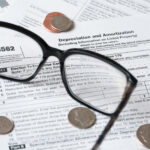By Gary G. Wallace, CPA, Managing Partner

The IRS issued Notice 2018-76 providing “transitional guidance” to taxpayers regarding business meals that are purchased in an entertainment context. The IRS also announced that they intend to publish proposed regulations and until the regulations are effective, taxpayers may rely on the Notice.
Deductibility for Business Meals and Entertainment Expenses
The 2017 Tax Act generally prohibits any tax deductions for entertainment expenses. Prior to the Notice, there was some level of uncertainty as to whether certain business meals were considered entertainment or entertainment related and thus nondeductible. The Tax Act did not clearly address such circumstances. However, the legislative history generally indicated that taxpayers may deduct 50% of food and beverage expenses associated with operating their trade or business.
The Notice provides guidance and indicates that taxpayers may deduct 50% of an otherwise allowable business meal expense if:
1) The expense is an ordinary and necessary expense under Code Sec. 162(a) paid or incurred during the tax year in carrying on any trade or business;
2) The expense is not lavish or extravagant under the circumstances;
3) The taxpayer, or an employee of the taxpayer, is present at the furnishing of the food or beverages;
4) The food and beverages are provided to a current or potential business customer, client, consultant, or similar business contact; and
5) In the case of food and beverages provided during or at an entertainment activity, the food and beverages are purchased separately from the entertainment, or the cost of the food and beverages is stated separately from the cost of the entertainment on one or more bills, invoices, or receipts. The entertainment disallowance rule may not be circumvented through inflating the amount charged for food and beverages.
Business Meals and Entertainment Deduction Examples
The Notice provides several examples and indicates that for each example, assume that the food and beverage expenses are ordinary and necessary expenses under Code Sec. 162(a) paid or incurred during the tax year in carrying on a trade or business and are not lavish or extravagant under the circumstances. Also assume that the taxpayer and the business contact are not engaged in a trade or business that has any relation to the entertainment activity.
Example 1: Taxpayer A invites B, a business contact, to a baseball game. A purchases tickets for A and B to attend the game. While at the game, A buys hot dogs and drinks for A and B.
The baseball game is entertainment as defined in Reg. § 1.274-2(b)(1)(i) and, thus, the cost of the game tickets is an entertainment expense and is not deductible by A. The cost of the hot dogs and drinks, which are purchased separately from the game tickets, is not an entertainment expense and is not subject to the Code Sec. 274(a)(1) disallowance.
Therefore, A may deduct 50% of the expenses associated with the hot dogs and drinks purchased at the game.
Example 2: Taxpayer C invites D, a business contact, to a basketball game. C purchases tickets for C and D to attend the game in a suite, where they have access to food and beverages. The cost of the basketball game tickets, as stated on the invoice, includes the food and beverages.
The basketball game is entertainment as defined in Reg. § 1.274-2(b)(1)(i) and, thus, the cost of the game tickets is an entertainment expense and is not deductible by C. The cost of the food and beverages, which are not purchased separately from the game tickets, is not stated separately on the invoice. Thus, the cost of the food and beverages also is an entertainment expense that is subject to the Code Sec. 274(a)(1) disallowance.
Therefore, C may not deduct any of the expenses associated with the basketball game.
Example 3: Assume the same facts as in Example 2, except that the invoice for the basketball game tickets separately states the cost of the food and beverages.
As in Example 2, the basketball game is entertainment as defined in Reg. § 1.274-2(b)(1)(i) and, thus, the cost of the game tickets, other than the cost of the food and beverages, is an entertainment expense and is not deductible by C. However, the cost of the food and beverages, which is stated separately on the invoice for the game tickets, is not an entertainment expense and is not subject to the Code Sec. 274(a)(1) disallowance.
Therefore, C may deduct 50% of the expenses associated with the food and beverages provided at the game.
Possible Further Business Meals and Entertainment Guidance
In the Notice, the IRS also requests comments from taxpayers, including:
1) Whether further guidance is needed to clarify the interaction of Sec. 274(a)(1)(A) entertainment expenses and business meal expenses.
2) Whether the definition of entertainment in Regs. Sec. 1.274-2(b)(1)(i) should be retained and, if so, whether it should be revised.
3) Whether the objective test in Regs. Sec. 1.274-2(b)(1)(ii) should be retained and, if so, whether it should be revised.
4) Whether the IRS should provide more examples in the regulations.
The Keiter team is monitoring tax news and updates closely. We will keep you informed of changes and planning opportunities.
Questions on this topic? Please contact your Keiter representative or Email | Phone: 804.747.0000. We are here to help.
Source: IRS
Additional Tax Resources:
About the Author
The information contained within this article is provided for informational purposes only and is current as of the date published. Online readers are advised not to act upon this information without seeking the service of a professional accountant, as this article is not a substitute for obtaining accounting, tax, or financial advice from a professional accountant.



